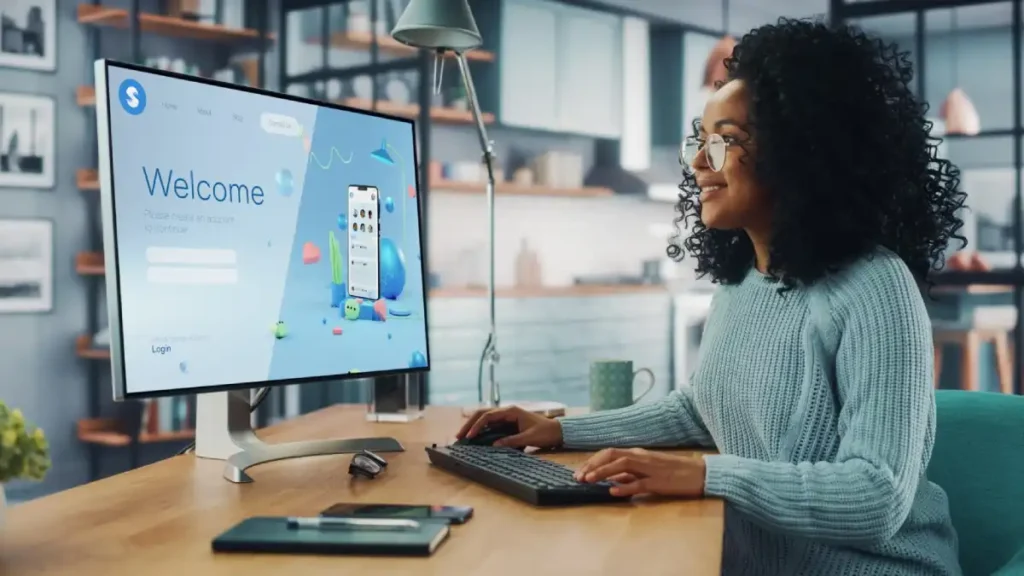You’re looking for the best Portland website designers to help your business stand out online. This article explores how to find the perfect partner for your unique needs, helping you make smart decisions for your digital presence.
A strong website isn’t just a nice-to-have; it’s a vital tool for business success. In a dynamic city like Portland, where local businesses thrive on community and online visibility, your website becomes your digital storefront, your marketing hub, and often, your first impression. Let’s explore how to choose the right Portland website designers to help you achieve your goals.
Why Your Business Needs a Great Website

Having a professional website makes a big difference. It’s often the first place potential customers look for information about your business. A well-designed site builds trust and shows you are serious about what you do. 94% of first impressions are based on design,” and “The design of a website has an impact on the judgment of credibility by 70%.
Think about it:
- Making a Great First Impression: A modern, user-friendly website instantly conveys to visitors that you are professional and trustworthy. Research shows that 75% of users judge a company’s credibility based on its website design (Stanford University).
- Reaching Customers: Your website works 24/7. It connects you with people in Portland and beyond, even when your physical doors are closed.
- Bringing in Business: A good website does more than just look pretty. It guides visitors to take action, like contacting you, buying a product, or signing up for a service. This directly helps you grow.
- Standing Out in Portland: Our city is full of amazing businesses. A unique and effective website helps you shine brighter and attract your ideal customers.
What Top Portland Website Designers Can Do for You: Services Explored

When you partner with skilled Portland website designers, you gain access to a range of services designed to build and improve your online presence. It’s more than just putting words and pictures on a screen.
Core Website Design & Development
Great web design starts with a solid foundation. These services create the look, feel, and functionality of your site.
- Custom Website Design & Redesign (UI/UX): This involves creating a distinctive visual identity for your brand. User Interface (UI) focuses on the visual elements users interact with, like buttons and menus. User Experience (UX) ensures the site is easy, enjoyable, and effective to use. A good UI/UX design can reduce bounce rates by optimizing navigation and content layout, keeping visitors on your site longer. Poor Design and Content Drive 38% of Web Visitors Away
- Responsive Design: Websites must look and work perfectly on any device – desktops, laptops, tablets, and smartphones. Over half of all global web traffic now comes from mobile devices. Mobile devices accounted for 60.4% of all web traffic as of October 2024. Responsive design makes sure your site adapts smoothly to every screen size. As you consider all these aspects of finding the perfect, remember that a key element of any successful website today is its performance on smaller screens. To dive deeper into ensuring your site looks and functions perfectly for every visitor, read my detailed article on Mobile Website Design.
- E-commerce Solutions: If you sell products online, a designer sets up your online store. They use platforms like Shopify or WooCommerce, or build custom solutions, to create a secure and easy shopping experience for your customers. WooCommerce powers 21% of WordPress sites. This includes product listings, shopping carts, and secure payment processing.
- Content Management Systems (CMS) Development: Most modern websites use a CMS like WordPress. This allows you to easily update your website content without needing a designer for every small change. A good designer will set up your CMS, making it simple for you to manage your site. WordPress powers 43.6% of all websites globally as of May 2025.
- Website Maintenance & Security: A website needs ongoing care. This includes regular updates, security checks, and backups to keep your site running smoothly and safely. Neglecting maintenance can lead to vulnerabilities. A recent report from Sucuri found that over 90% of hacked websites in 2023 ran on WordPress, often due to outdated plugins or themes.
Integrated Digital Marketing & Strategy
A great website is a powerful marketing tool. Many Portland website designers offer services to help your site attract visitors and achieve business goals.
- Search Engine Optimization (SEO) Fundamentals: SEO helps your website appear higher in Google search results. This involves optimizing content, keywords, and technical elements so people searching for your services can find you easily. According to a BrightLocal article, January 14, 2025, 46% of monthly Google searches have local intent.
- Conversion Rate Optimization (CRO): CRO focuses on turning website visitors into customers. Designers analyze user behavior and make changes to improve forms, calls to action, and page layouts, guiding visitors towards completing desired actions.
- Content Strategy & Copywriting Support: What you say on your website matters. Designers often help plan your content and even assist with writing clear, compelling text that engages your audience and supports your SEO efforts. According to highervisibility.com, Articles of 3,000 words or more get twice the amount of page views, as well as 24% more shares
- Integration with Other Tools: Your website should work with your other business systems. This might include connecting with Customer Relationship Management (CRM) software, email marketing tools, or analytics platforms to track performance.
Finding Your Perfect Match: Key Qualities in Portland Website Designers

Choosing the right partner is a big decision. Here are key qualities to look for and questions to ask.
Portfolio & Proven Track Record
Always look at a designer’s past work.
- Reviewing Projects: Browse their online portfolio. Do their designs look modern and professional? Can you see examples of websites similar to what you need?
- Live Examples: Visit the websites they built. How do they perform? Are they easy to navigate? Do they load quickly? Look for diversity in their work to see their range.
Communication & Collaboration
Effective communication makes any project smoother.
- Clear and Timely Responses: Do they respond to your emails and calls quickly and clearly? Good communication from the start means less frustration later.
- A Partnership Approach: The best designers involve you in the process. They listen to your ideas, provide updates, and seek your feedback at every stage.
Understanding Your Business
A good designer learns about your business, not just design trends.
- Asking the Right Questions: Do they ask about your industry, your target customers, and what you hope to achieve with the website? A designer who asks thoughtful questions shows they care about your success.
- Tailoring Solutions: They should propose solutions that fit your specific business needs and goals, not just generic templates.
Technical Know-How & Future Thinking
Web technology changes fast. Your designer should keep up.
- Staying Current: They should understand modern web standards, coding practices, and tools. This ensures your website is built on a strong foundation.
- Building for Growth: Your website should grow with your business. Ask if their solutions are scalable and flexible enough to add new features or expand in the future.
Gaining a Deeper Edge: Finding a Designer Who Truly Shines

Beyond the basics, some qualities make Portland website designers truly exceptional. Let’s explore aspects that often go unexamined but can redefine your project’s success.
Do They Truly Know Your Niche? Uncovering Industry-Specific Expertise
Imagine hiring an architect who only designs houses, but you need a skyscraper. The same applies to websites. While many Portland website designers can build a great general website, a designer with deep roots in your specific industry can offer a significant advantage.
- Why Industry Focus Matters:
- Knowing Your Customers: They understand your audience’s unique needs, language, and online behavior. For example, a designer specializing in healthcare websites knows the importance of HIPAA compliance and clear patient information, while one focusing on craft breweries understands visual branding and event listings.
- Understanding Industry Trends: They stay current with digital trends and expectations within your sector. This could mean specific e-commerce features for retail, booking systems for hospitality, or secure portals for financial services.
- Avoiding Common Pitfalls: They’ve likely navigated specific regulatory requirements, competitive nuances, or technical challenges unique to your field before. This saves you time and prevents costly mistakes.
- How to Discover This Expertise:
- Look Beyond the General Portfolio: While general portfolios are good, ask for specific case studies or examples of work in your industry.
- Ask Direct Questions: “Have you worked with [Your Industry] businesses before? What were some unique challenges you faced? How did you solve them?”
- Observe Their Questions to You: A designer who asks specific questions about your industry’s operational details, target demographics, or competitive landscape shows genuine understanding.
Think of it like this: A designer for a local Portland bakery might instinctively know that high-quality, mouth-watering photos are key, and that an easy-to-use online ordering system is crucial. A designer for a legal firm would prioritize clear navigation, trust-building content, and discreet contact forms. This specialized insight can fast-track your project and improve results.
Unveiling the Cost: Understanding Pricing Models and True Value
The question, “How much does a website cost?” is never simple. Prices for Portland website designers can vary widely. It’s not just about the number on the invoice; it’s about understanding what that number represents and the value you receive. I know that budget is a key concern for many local entrepreneurs. If you’re a small business looking for smart strategies to get a powerful online presence without breaking the bank, explore my comprehensive guide on Affordable Web Design for Small Business on a Budget. It offers practical tips and solutions to help you achieve your digital goals efficiently.
- Common Pricing Models Explained:
- Project-Based (Fixed-Fee): This is common for clearly defined projects. You agree on a set price for the entire scope of work. It offers predictability.
- Hourly Rates: Used for ongoing work, small updates, or projects with undefined scope. This requires careful tracking of hours.
- Retainer: A monthly fee for ongoing services like maintenance, updates, and continuous optimization. This builds a long-term relationship.
- What Shapes the Price Tag?
- Complexity: A simple brochure site costs less than a large e-commerce platform with custom features.
- Features: Special functions like booking systems, member portals, or complex integrations add to the cost.
- Content: Who writes the text and provides images? If the designer handles this, it adds to the cost but often leads to better results.
- Timeline: Rush projects can cost more.
- Team Size/Expertise: A solo freelancer might be less expensive than a full-service agency with a larger team of specialists.
- Focus on Value, Not Just Cost: A cheaper website that fails to attract customers or generate leads ends up costing you more in lost business. An investment in a well-designed, strategic website that brings in new clients can offer an incredible return.
- Real Example: A small Portland boutique spent $3,000 on a template website. It looked okay, but struggled to rank on Google and convert visitors. After a year, they invested $12,000 in a custom-designed, SEO-optimized site. Within six months, their online sales increased by 40%, far outweighing the initial higher cost.
- What a Good Proposal Shows You: A detailed proposal should break down costs by phase or service. It should clearly explain what you get for your money. Avoid designers who offer vague estimates without understanding your project. According to a 2024 survey of web design costs, small business websites can range from $1,000 to $15,000+, depending on complexity and features (GoodFirms, 2024).
Beyond the “Great Job!”: Unpacking the True Story Behind Case Studies
Many designers show testimonials saying “they did a great job!” While nice, truly insightful case studies tell a richer story. They offer a window into a designer’s problem-solving skills and the real impact they deliver.
- What Makes a Case Study Powerful?
- The Problem: What challenge did the client face before working with the designer? Was it low sales, poor online visibility, outdated branding, or a difficult user experience?
- The Strategy: How did the Portland website designers approach this challenge? What unique solutions did they propose? Did they conduct market research, user testing, or a full content audit?
- The Execution: How did they bring the solution to life? What steps did they take? What choices did they make in design or development?
- Measurable Results: This is crucial. Did organic traffic increase by X%? Did conversion rates go up by Y%? Did bounce rates decrease? Did they help streamline a business process, saving Z hours per week?
- Client Quote with Context: A quote that explains how the designer made a difference, rather than just praising their work.
- Questions to Ask About Case Studies: “Could you walk me through the specific challenge this client faced? What was your unique approach? What quantifiable results did they see after the launch?” This helps you see how they think and deliver.
Building for Tomorrow: The Long-Term Partnership and Ongoing Support
A website isn’t a “set it and forget it” project. Just like a garden, it needs tending. Many overlook the importance of post-launch support and a long-term partner.
- Why Ongoing Support Matters:
- Security Updates: Websites need regular updates to plugins, themes, and core software to patch security vulnerabilities. In 2023, 85% of website breaches were due to unpatched software (IBM Security).
- Performance Optimization: Websites can slow down over time. Ongoing optimization ensures fast loading speeds, which impacts user experience and SEO. Google considers page speed a ranking factor.
- Content Freshness: Search engines favor websites with fresh, relevant content. Regular updates keep your site lively and help with SEO.
- Bug Fixes: Technology can be unpredictable. A reliable partner can quickly fix issues if they arise.
- Beyond Basic Maintenance:
- Strategic Guidance: A good designer can act as a long-term digital consultant, suggesting new features, marketing integrations, or design improvements as your business grows and market trends change.
- Scalability Planning: They help you plan for future expansions, ensuring your website can handle increased traffic or new service offerings.
- Training & Empowerment: They teach you how to make basic updates yourself, giving you more control over your site.
- Example: A Portland small business owner hired a designer for a new website. After launch, they thought the job was done. When their site experienced slow loading times and security warnings six months later, they struggled to find support. A designer who offers ongoing maintenance plans and strategic reviews ensures your website remains a robust asset for years to come. Look for packages that include regular backups, security monitoring, and performance checks.
Beyond the Usual: Exploring Niche Technologies and Custom Solutions
Most Portland website designers work with popular platforms like WordPress or Shopify. These are excellent tools. However, for unique business needs, you might want a designer who knows more specialized technologies or can build something entirely custom.
- When “Off-the-Shelf” Isn’t Enough:
- Complex Integrations: You might need your website to talk to a specific inventory system, a custom CRM, or a unique industry database. This often requires deep knowledge of APIs (Application Programming Interfaces).
- Unique Functionality: Your business might require a custom calculator, a specialized booking system, or an interactive data visualization tool that isn’t available as a standard plugin.
- High Performance Needs: For very high-traffic sites or complex web applications, custom-built solutions using frameworks like React, Vue.js, or Laravel can offer superior performance and flexibility.
- What to Ask: “Beyond popular CMS platforms, do you have experience with specific coding languages or frameworks? Can you give me an example of a custom feature you built for a client?” This shows if they can think outside the box when needed.
Spotting the Signals: How to Avoid a Mismatched Partnership
Just like in any important business relationship, some warning signs can tell you a designer might not be the right fit. It’s important to trust your instincts and look for these “red flags.”
- No Clear Portfolio or References: If a designer can’t show you examples of their work or provide client references, that’s a serious concern. How can you judge their quality or reliability?
- Poor Communication from the Start: Are they slow to respond? Do they use confusing jargon? If communication is difficult now, imagine how it will be during the project. Clear, open dialogue is essential.
- Unrealistically Low Prices or “Too Good to Be True” Offers: While everyone loves a deal, professional web design is an investment. Extremely low prices often mean hidden costs, rushed work, or a lack of crucial services. If their quote is significantly lower than others, ask why.
- Lack of Interest in Your Business: A designer who doesn’t ask about your goals, target audience, or industry challenges probably won’t build a website that truly serves your business. They should be curious about you.
- No Contract or Vague Terms: A professional designer will provide a clear, detailed contract outlining the scope of work, timeline, costs, and responsibilities. Avoid anyone who wants to work on a handshake or provides a vague agreement.
- Promising Overnight Success (Especially with SEO): Building a strong online presence takes time. Be wary of designers promising top Google rankings in a week or guaranteeing a sudden flood of sales. Sustainable growth comes from consistent effort.
- They Don’t Ask for Your Content: A website needs text, images, and possibly videos. If a designer doesn’t discuss content creation or expect you to provide it, it’s a warning. Content is the heart of your website.
Designing with Conscience: The Power of Ethical & Accessible Web Design
In 2024, a truly great website is not just functional and beautiful; it’s also responsible and inclusive. This means embracing ethical design practices and prioritizing accessibility.
- Ethical Design Practices:
- User Privacy: A designer should build sites that respect user data. This means clear privacy policies, getting consent for cookies, and avoiding deceptive practices to collect information. Data privacy is a growing concern for users globally.
- Transparency: Being open about how the website functions, what data it collects, and how users can control their experience.
- Avoiding Manipulation: Designers should not use tactics that trick users into actions they don’t intend, often called “dark patterns.” Ethical design builds trust.
- Accessibility for Everyone:
- WCAG Compliance: The Web Content Accessibility Guidelines (WCAG) provide standards for making web content accessible to people with disabilities. This includes those with visual, auditory, motor, or cognitive impairments.
- Benefits Beyond Compliance: An accessible website serves a wider audience, including an aging population, people with temporary disabilities, or those using different devices. It also shows a commitment to inclusivity, enhancing your brand reputation. Making your website accessible can also improve its SEO, as search engines favor well-structured and usable sites.
- What to Ask: “How do you ensure the websites you build are accessible? What is your approach to user data privacy?” The city of Portland itself is working to ensure its web content and mobile apps meet WCAG 2.1, Level AA standards by April 2026 (Portland.gov, 2025). This shows the local importance of accessibility.
Your Journey to a New Website: The Project Timeline

Once you have a good understanding of what you need, the process usually follows a clear path.
- A. Defining Your Needs & Budget: Before you even talk to designers, write down what you want your website to do. What’s your purpose? Who is your audience? What features do you need? Having a clear idea helps designers give accurate quotes.
- B. Researching Portland Designers: Use online searches, ask for referrals, and check out portfolios. Create a shortlist of Portland website designers who seem like a good fit.
- C. Requesting Proposals & Consultations: Reach out to your top choices. Share your needs and ask them to propose a solution and cost. Use this time to ask the deep questions we discussed.
- D. Evaluating Proposals & Making Your Decision: Compare proposals not just on price, but on value, clear communication, and how well they understand your vision. Don’t rush this step.
- E. Project Kick-off & Collaboration: Once you choose a designer, they start planning. This phase involves detailed discussions, content gathering from you, and regular check-ins. A typical custom website project can take anywhere from 4 to 16 weeks, depending on its complexity and how quickly you provide feedback (Dorik, 2025).
Conclusion: Your Partner for Digital Success in Portland
Finding the right Portland website designers is a strategic move for any business looking to thrive. It’s about more than just a pretty design; it’s about building a digital foundation that supports your growth, connects with your audience, and stands strong for years to come. By asking the right questions, looking for specific expertise, understanding pricing, and valuing long-term partnerships, you’ll find a designer who becomes a true ally in your business journey. Your amazing new website is waiting for you!
Frequently Asked Questions
- How long does it typically take to build a website in Portland?
- A simple website might take 3-5 weeks. More complex sites with custom features or e-commerce can take 2-4 months or longer. Your responsiveness with feedback and content also affects the timeline.
- What’s the average cost for a website from Portland website designers?
- Costs vary widely. A basic business website might start around $3,000 to $7,000. Mid-range sites with more features could be $7,000 to $15,000. Complex e-commerce or custom solutions can go up to $50,000 or more. It depends on complexity, features, and the designer’s experience.
- Do I need to provide all the website content myself?
- Often, yes. You know your business best. However, many Portland website designers offer copywriting services or can recommend copywriters to help you.
- What happens after my website launches?
- After launch, it’s vital to have a plan for maintenance, security updates, and performance monitoring. Many designers offer ongoing support packages to keep your site running smoothly and securely.
- Can a local Portland website designer help me with SEO?
- Absolutely. Many Portland website designers integrate basic SEO practices into their design and development process. For more advanced SEO strategies, they might offer dedicated services or partner with an SEO specialist.

